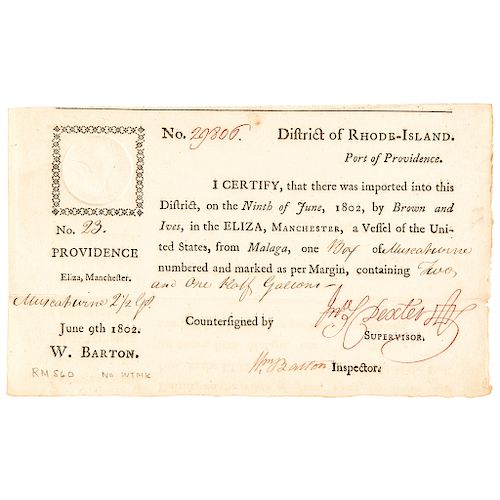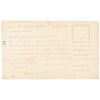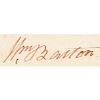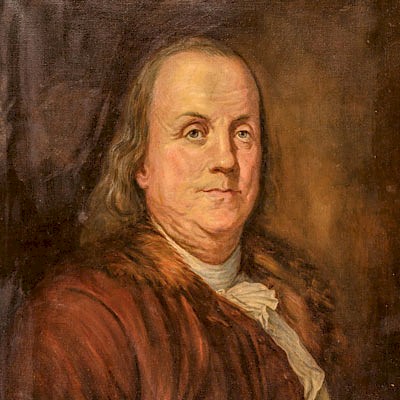General WILLIAM BARTON Signed Partly-Printed Providence Port Inspector Document
Lot 5
Estimate:
$600 - $800
Absentee vs Live bid
Two ways to bid:
- Leave a max absentee bid and the platform will bid on your behalf up to your maximum bid during the live auction.
- Bid live during the auction and your bids will be submitted real-time to the auctioneer.
Bid Increments
| Price | Bid Increment |
|---|---|
| $0 | $10 |
| $200 | $20 |
| $300 | $25 |
| $500 | $50 |
| $1,000 | $100 |
| $2,000 | $200 |
| $3,000 | $250 |
| $5,000 | $500 |
| $10,000 | $1,000 |
| $20,000 | $2,000 |
| $30,000 | $2,500 |
| $50,000 | $5,000 |
| $100,000 | $10,000 |
| $200,000 | $20,000 |
| $300,000 | $25,000 |
| $500,000 | $50,000 |
About Auction
By Early American History Auctions
Aug 24, 2019
Set Reminder
2019-08-24 12:00:00
2019-08-24 12:00:00
America/New_York
Bidsquare
Bidsquare : Autographs, Colonial Currency, Political Americana, Historic Guns
https://www.bidsquare.com/auctions/early-american-history-auctions/autographs-colonial-currency-political-americana-historic-guns-4347
Historic Autographs • Colonial Currency • American Civil War Colonial Era • Revolutionary War • Political Americana • Black History Early American History Auctions auctions@earlyamerican.com
Historic Autographs • Colonial Currency • American Civil War Colonial Era • Revolutionary War • Political Americana • Black History Early American History Auctions auctions@earlyamerican.com
- Lot Description
Autographs
Scarce Historic Revolutionary War General William Barton Signed Partly-Printed Providence Port Inspector Document
WILLIAM BARTON (1748-1831). Officer in the Continental Army during the American Revolutionary War a Lt. Colonel, fought in the Battle of Bunker Hill, who later served as Adjutant General of the Rhode Island Militia. By Resolution of Congress, 25 July 1777, an "elegant sword" to be presented for his capturing British General Richard Prescott and Major William Barrington, his Aide-de-Camp.
June 9, 1802-Dated, Partly-Printed Document Signed, "Wm Barton" as Inspector, measuring 5" x 8.5", 1 page, Providence, Rhode Island, Choice Extremely Fine. Willliam Barton has signed as Port Inspector for "one Box of Muscat wine numbered and marked as per Margin, containing Two and One Half Gallons". Also signed "Jn S. Dexter" as Port Supervisor. Embossed U.S. Revenue Seal with Heraldic American Eagle at upper left. Scott catalog RM-560. Boldly printed on fresh clean laid period paper on this special typeset form having "W. BARTON" printed in typeset and Signed by him in red ink as "Wm Barton - Inspector" at bottom. A rare official form, fully executed and impressive in eye appeal for display.
William Barton (1748-1831) was an officer in the Continental Army during the American Revolutionary War who retired with the rank of colonel. He later served as adjutant general of the Rhode Island militia.
On August 2, 1775 he was appointed the adjutant of Richmond's Rhode Island Regiment. He was promoted to captain on November 1, 1775.
In late June and early July 1777, as a major in the Rhode Island state troops, he planned and led a raid on British headquarters, capturing Major General Richard Prescott. On the night of July 10-11, with 38 men and six officers in five whaleboats, Barton crossed Narragansett Bay, passed unobserved by three British frigates, and, landing about halfway between Newport and Bristol Ferry, went to the farm house where Prescott had his headquarters. The guards were surprised, the door of Prescott's room was broken in, and the general was hurried away half dressed and taken to Warwick Point, and afterward to Providence. For this exploit, the Continental Congress gave Barton a sword and passed a resolution honoring his service.
After the Revolution Barton was active in the state militia. He served as the brigadier general in command of the Providence County Brigade from May 1794 until he became major general in command of the Rhode Island Militia from May 1802 to May 1809.
He helped to found the town of Barton, Vermont. Subsequently, Barton was successfully sued in court for selling the same land to two different parties. He refused to pay this debt. For this he was ultimately confined to the debtors' prison in Danville for 14 years, starting at the age of sixty-four. At the age of seventy-seven, he was released at the initiative of the visiting Marquis de Lafayette, who agreed to pay the balance of his debt.
- Shipping Info
-
Early American provides in-house worldwide shipping. Please contact us directly if you have questions about your specific shipping requirements.
-
- Buyer's Premium



 EUR
EUR CAD
CAD AUD
AUD GBP
GBP MXN
MXN HKD
HKD CNY
CNY MYR
MYR SEK
SEK SGD
SGD CHF
CHF THB
THB














